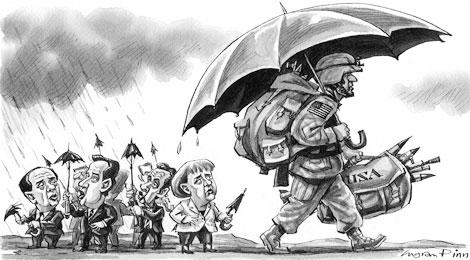
From John R. Deni, the New Atlanticist: The recent announcement that the Obama administration plans to cut two of the four remaining US brigade combat teams (BCTs) in Europe came as no surprise to those tracking the ongoing debate over the future size of the American military and the Army in particular. Assuming the Army is getting smaller, it’s obviously easier to draw down units based in Europe than in a place like Georgia or Texas, since there are of course no US Congressmen or Senators representing Grafenwoehr, Germany or Vicenza, Italy.
What will probably come as a surprise to many, though, is that such cuts are unlikely to result in any appreciable defense budget savings over time, and if they do they’ll likely prove highly damaging to US national security interests in the long run as it becomes more difficult to maintain interoperability with our most likely, most capable future coalition partners. . . .
In cutting US presence in Europe, the Department of Defense believes it can maintain the necessary coalition capability by rotating forces from the continental United States to overseas training events and exercises, but this is problematic for two reasons.
First, the cost of such rotations on an annual basis will quickly add up to an unsustainable level. For example, the transportation costs of implementing the 2012 exercise program of one of those Europe-based brigades – roughly $720,000 – is over 14 times higher when implemented by a similar brigade based in Texas, at about $10.4 million. Therefore, it is very likely that either the US government will achieve little savings as it strives to maintain an adequate level of military engagement overseas or that large training or exercise rotations overseas will become prohibitively expensive and therefore quite rare.
Second, allied interoperability – the basis for future military coalitions – is likely to be far more difficult to maintain with fewer forces based overseas. Periodic rotations of small military training teams sent from America to work with foreign counterparts overseas may help to build some minimal capacity through familiarization visits and classroom interaction. However, the kind of interoperability necessary to ensure success during high intensity coalition operations is most effectively achieved through regular, major military exercises – the kind that forward-based US soldiers in Europe have been doing for decades.
John R. Deni is a Research Professor of National Security Studies at the Strategic Studies Institute. The views expressed are his alone, and do not necessarily reflect those of the U.S. Army, the Department of Defense, or the U.S. Government. (graphic: Ingram Pinn/Financial Times)
Image: ft%204%2016%2011%20Ingram%20Pinn%20Yanks%20going%20home_0.jpg
